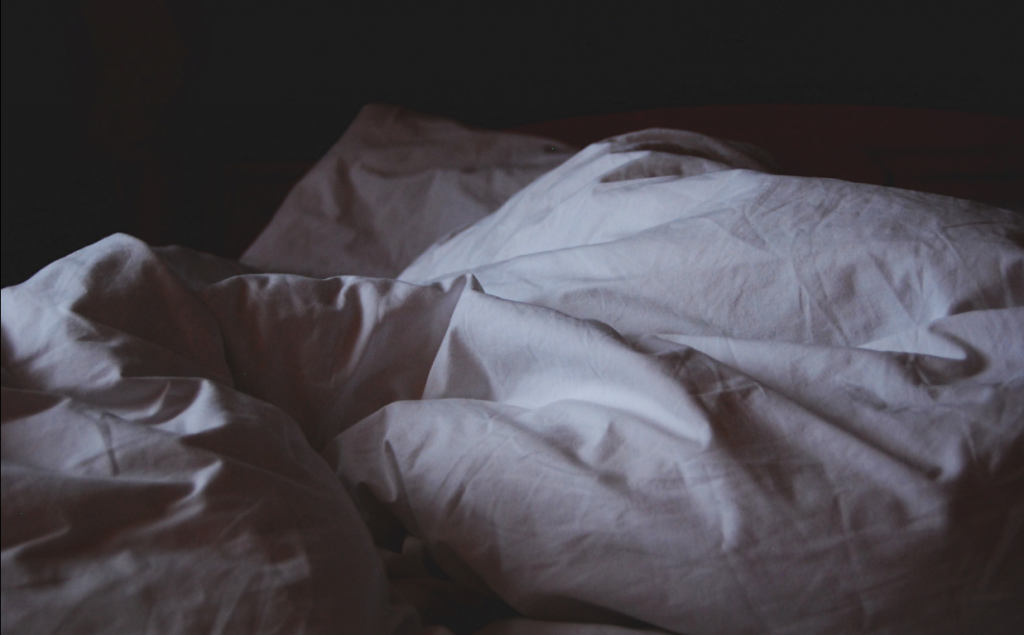How to Solve Sleep Problems

There are nights when you don’t sleep as well as you would like. You’re exhausted, ready to sleep but it doesn’t come. Then you start to obsessively look at the clock to see how much time has gone by. It’s essential to rest but it is elusive. It’s important to know how to solve sleep problems.
It makes you feel more and more nervous. You tell yourself, “I’m not going to sleep at all. I have a thousand things to do. Tomorrow I’m not going to make it through work. The day is going to kill me.” All these thoughts make you enter a cycle that is difficult to escape from. How can you possibly fall asleep like this? Read on!
“I go to bed, but I cannot sleep: two passions, love and hate, keep me awake.”
-Jan Potocki-
What environmental factors contribute to sleep problems?
The first thing you need to to in order to get to sleep is to be aware of the environmental factors that prevent you from sleeping well. For example, there might be a lot of noise coming from the street, the room temperature may be too hot or cold, there might be too much light, etc. Once you know the problems, you’ll be able to remedy them.
How can you encourage a state of rest? On the one hand, to reduce noise you can furnish your room more, putting a blanket on the door and cloth curtains over the windows, as well as cork on the floor. It’s also better for bedrooms to be warm colors and for them to be aired out every day. The ideal temperature should be about 68 to 72 degrees, and if possible it is convenient to sleep with the door ajar to let air circulate.
It is also best to not sleep with plants in the room, as they consume oxygen in the air. Try to make sure your bed is not too small so that you can move around at night. The mattress should also be high quality. Remember the adage: “Invest in your bed and invest in your shoes, because if you’re not in one you’re in the other.”
Instead of using excess blankets, it’s best to use a feather comforter because it is lighter and breathes better. Pillows shouldn’t be too thick so that the neck is not in a forced position.

Habits that will help you get to sleep
Just as there are environmental factors that can hinder you at bedtime, your lifestyle also plays a significant role. How and what you eat, whether or not you exercise, and your consumption of stimulants like caffeine are determining factors. These are known as sleep habits.
“Sleep does not want to rush.”
-Fernando de Rojas-
What can you do about this? A good habit is doing physical exercise during the day, but beware! If done before bed, it is counterproductive. With regard to food, it is better to have a light dinner at an early hour for digestion to be finished in time for bed. In addition, it’s even better to eat foods rich in calcium and vitamin B because these have sedative properties.
Also avoid chocolate or a lot of sugar, as well as stimulants like coffee, tea or soda. It is not recommended to drink alcohol or to smoke several hours before you get to sleep. Eating well also helps prevent waking up in the middle of the night.
Using the bedroom for things other than sleep
There are times when everything else is in place, but you still struggle to get to sleep. This may be because you do other activities in the room that are incompatible with sleep. If this is the case, when you enter the room you activate physically and mentally.
When this happens, you must follow a few steps: go to bed alone when you are sleepy and turn off the lights. Do not eat, study or watch TV in the room, and don’t use the bed for anything other than sleeping or having sex.
“You have to work eight hours and sleep eight hours, but not the same ones.”
-Woody Allen-
It is also good to establish a series of habits that you do every night that tells you it’s close to bedtime. For example, each night put on pajamas, brush your teeth, close the door, turn off the light and get into bed, always in the same order. If you haven’t fallen asleep within 10 to 15 minutes, it’s best to go to another room and do some quiet activity until you start to fall asleep.
Once this happens, you can go back to bed to get to sleep and thus recharge your brain. Repeat this step as many times as necessary. Finally, it is not recommended that you nap, and you should always get up at the same time, no matter how long you have been sleeping.

All of these behaviors will be difficult at first, but if you strive to do them on a daily basis, they will become habits that will help you overcome your sleep problems, to get to sleep faster and to enjoy better quality sleep. Adequate rest is the foundation of good physical, psychological and emotional functioning. That is why we invite you to put all of this into practice so that you get to sleep properly … to truly rest!
Images courtesy of Nomao Saeki, Krista Mangulsone and Lacie Slezak.
There are nights when you don’t sleep as well as you would like. You’re exhausted, ready to sleep but it doesn’t come. Then you start to obsessively look at the clock to see how much time has gone by. It’s essential to rest but it is elusive. It’s important to know how to solve sleep problems.
It makes you feel more and more nervous. You tell yourself, “I’m not going to sleep at all. I have a thousand things to do. Tomorrow I’m not going to make it through work. The day is going to kill me.” All these thoughts make you enter a cycle that is difficult to escape from. How can you possibly fall asleep like this? Read on!
“I go to bed, but I cannot sleep: two passions, love and hate, keep me awake.”
-Jan Potocki-
What environmental factors contribute to sleep problems?
The first thing you need to to in order to get to sleep is to be aware of the environmental factors that prevent you from sleeping well. For example, there might be a lot of noise coming from the street, the room temperature may be too hot or cold, there might be too much light, etc. Once you know the problems, you’ll be able to remedy them.
How can you encourage a state of rest? On the one hand, to reduce noise you can furnish your room more, putting a blanket on the door and cloth curtains over the windows, as well as cork on the floor. It’s also better for bedrooms to be warm colors and for them to be aired out every day. The ideal temperature should be about 68 to 72 degrees, and if possible it is convenient to sleep with the door ajar to let air circulate.
It is also best to not sleep with plants in the room, as they consume oxygen in the air. Try to make sure your bed is not too small so that you can move around at night. The mattress should also be high quality. Remember the adage: “Invest in your bed and invest in your shoes, because if you’re not in one you’re in the other.”
Instead of using excess blankets, it’s best to use a feather comforter because it is lighter and breathes better. Pillows shouldn’t be too thick so that the neck is not in a forced position.

Habits that will help you get to sleep
Just as there are environmental factors that can hinder you at bedtime, your lifestyle also plays a significant role. How and what you eat, whether or not you exercise, and your consumption of stimulants like caffeine are determining factors. These are known as sleep habits.
“Sleep does not want to rush.”
-Fernando de Rojas-
What can you do about this? A good habit is doing physical exercise during the day, but beware! If done before bed, it is counterproductive. With regard to food, it is better to have a light dinner at an early hour for digestion to be finished in time for bed. In addition, it’s even better to eat foods rich in calcium and vitamin B because these have sedative properties.
Also avoid chocolate or a lot of sugar, as well as stimulants like coffee, tea or soda. It is not recommended to drink alcohol or to smoke several hours before you get to sleep. Eating well also helps prevent waking up in the middle of the night.
Using the bedroom for things other than sleep
There are times when everything else is in place, but you still struggle to get to sleep. This may be because you do other activities in the room that are incompatible with sleep. If this is the case, when you enter the room you activate physically and mentally.
When this happens, you must follow a few steps: go to bed alone when you are sleepy and turn off the lights. Do not eat, study or watch TV in the room, and don’t use the bed for anything other than sleeping or having sex.
“You have to work eight hours and sleep eight hours, but not the same ones.”
-Woody Allen-
It is also good to establish a series of habits that you do every night that tells you it’s close to bedtime. For example, each night put on pajamas, brush your teeth, close the door, turn off the light and get into bed, always in the same order. If you haven’t fallen asleep within 10 to 15 minutes, it’s best to go to another room and do some quiet activity until you start to fall asleep.
Once this happens, you can go back to bed to get to sleep and thus recharge your brain. Repeat this step as many times as necessary. Finally, it is not recommended that you nap, and you should always get up at the same time, no matter how long you have been sleeping.

All of these behaviors will be difficult at first, but if you strive to do them on a daily basis, they will become habits that will help you overcome your sleep problems, to get to sleep faster and to enjoy better quality sleep. Adequate rest is the foundation of good physical, psychological and emotional functioning. That is why we invite you to put all of this into practice so that you get to sleep properly … to truly rest!
Images courtesy of Nomao Saeki, Krista Mangulsone and Lacie Slezak.
This text is provided for informational purposes only and does not replace consultation with a professional. If in doubt, consult your specialist.







